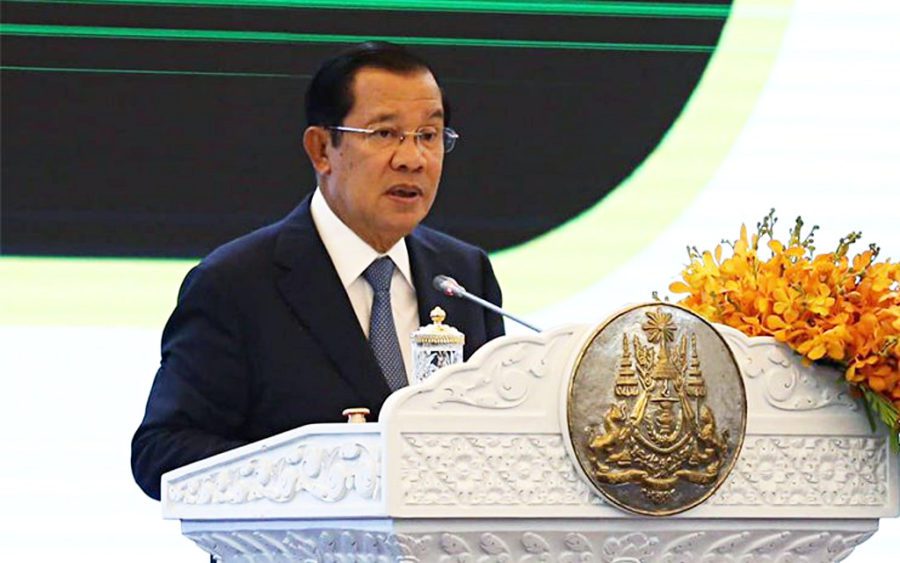Pressure from foreign states was forcing Cambodia to choose friends and enemies in the international arena, Prime Minister Hun Sen said on Friday, repeating his frequent claim that the government would not exchange its sovereignty for aid from any country.
“Of course, making friends with everyone is easier said than done, especially for a small country like Cambodia where external pressure often forces us to make friends, or make friends with this country, and consider another country as an enemy,” Hun Sen said during a speech at the Peace Palace in Phnom Penh.
“But no matter who we are friends with, it does not mean that Cambodia has given up its independence and sovereignty,” the prime minister said.
“I have never made any decision to suit any other country. I don’t do anything to harm the prosperity of the nation and the people,” he added.
Since the 2017 arrest of opposition leader Kem Sokha and dissolution of his CNRP two months later, some Western powers, including the U.S. and E.U., have criticized the government’s moves, calling for the dropping of treason charges against Sokha.
In 2018, Hun Sen’s ruling party won all 125 parliamentary seats on offer in a national election marked by the absence of a viable opposition challenger. The U.S. called the poll neither free nor fair.
Last year, the U.S. leveled economic sanctions against an official and timber tycoon with close ties to Hun Sen, and Congress has threatened other financial pressures, including a review of trade preferences.
The E.U. is expected to announce a decision within two weeks on whether it will suspend Cambodia’s duty-free and quota-free trade access to the European bloc, in whole or in part, if Cambodia is found to have failed to comply with international human rights conventions.
Cambodian officials have responded to the foreign pressure by calling the moves an interference in Cambodia’s domestic affairs.
Paul Chambers, an international affairs lecturer at Thailand’s Naresuan University, told VOD that since the 2018 national election, Cambodia has moved closer to China, and become more distant from the E.U.
On Thursday, Hun Sen said Cambodians in China, where at least 170 people have died from a new strain of coronavirus that has spread to more than a dozen countries, would not be evacuated home in order to avoid potential damage to bilateral relations and the Cambodian economy.
China provided more foreign aid and investment to Cambodia than any other international donor in 2018, according to the National Bank of Cambodia.
Cambodia-U.S. relations, meanwhile, had become a “tense amity,” according to Chambers, with human rights concerns becoming a less important part of U.S. policy under President Donald Trump, and Washington undertaking a “geopolitical duel with China in Cambodia.”
The U.S. was trying to get closer with Hun Sen, Chambers said in an email.
“The challenge for the Cambodian government is how to balance between the U.S. and China without either the U.S. or China becoming overly offended,” he said.
“It is a tricky tightrope act for Hun Sen. But if Cambodia simply tilts toward one of these superpowers, then Cambodia can expect potential future dependence on its chosen patron and destabilization efforts from the other,” he added.
Sophal Ear, an associate professor of diplomacy and world affairs at Occidental College in Los Angeles, said after the outlawing of the main opposition party in 2017, Cambodia’s foreign policy shifted strongly toward China.
“That’s precisely why an opposition is needed — to temper the imbalance in international relations that has taken place,” Ear said.
Choosing sides in international relations would not benefit Cambodia; balance was a better option, but it was not being pursued, he said.
“Instead, by choosing China, Cambodia follows a path that is not democratic, does not respect human rights, and is against freedom. The people lose.”
(Translated and edited from the original article on VOD Khmer)












